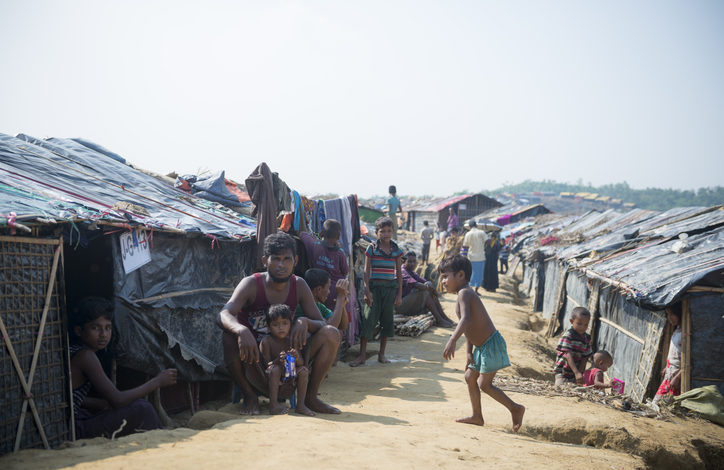The Unitarian Universalist Service Committee advances human rights through grassroots collaborations.
Genocide in Burma: The United States Can No Longer Mince Words

By Shayna Lewis & Mayuri Anupindi on December 6, 2018
International and domestic pressure to formally investigate and prosecute claims against the Burmese military for genocide against the Rohingya continues to grow and the U.S. government is overdue for action.
In early December, the Public International Law and Policy Group (PILPG) released a Factual Findings & Legal Analysis Report, concluding “that there are reasonable grounds to believe that genocide was committed against the Rohingya Muslim minority in Myanmar’s northern Rakhine State.” The U.S. Holocaust Memorial Museum issued a similar statement, “that there is compelling evidence that the Burmese military committed ethnic cleansing, crimes against humanity, and genocide against the Rohingya.” These statements echo earlier reports made by UUSC partner Fortify Rights in July, and the comprehensive final report of the UN Independent International Fact Finding Mission on Myanmar released in September. Investigator Marzuki Darusman stated,“[t]he full findings we are releasing today […] show why the top generals should be investigated and prosecuted for genocide in Rakhine State. I have never been confronted by crimes as horrendous and on such a scale as these.”
PILPG’s determination is based on 1,024 interviews with Rohingya refugees who fled to Bangladesh after violence broke out in August 2017. The UN High Commissioner for Refugees estimated that as many as 723,000 Rohingya had fled Burma as of August 2018. From their interviews, PILPG identified more than 13,000 instances of documented grave human rights violations, including crimes against humanity, genocide, and war crimes. Their stories paint a vivid, terrifying picture of systematic violence: “They were hunting us,” said a 25-year-old man from Buthidaung. A 65-year-old man from Maungdaw stated, “You could hear screaming. The girls were screaming so loud like their souls were leaving their bodies.”
These findings informed a U.S. State Department report released in September 2018. However, the Trump administration has stopped short of using the terms “crimes against humanity,” “genocide,” or “war crimes” to describe what has happened in Rakhine. Further, Senate Majority Leader Mitch McConnell has refused to bring the Burma Human Rights and Freedom Act of 2017 (S. 2060), a bill with bipartisan support that would impose tough sanctions on the Burmese army, to the Senate for a vote—despite a companion bill passing the House as an amendment to the National Defense Authorization Act (NDAA) last summer. UUSC has supported this legislation since its introduction.
Encouraged by the release of additional evidence, Senators Cardin, Young, Durbin, Rubio, and Merkley have re-introduced the Burma Human Rights and Freedom Act. “As one of the first members of Congress to label the Rohingya crisis a ‘genocide,’ I am encouraged by the Holocaust Museum’s analysis and conclusions…Passage of the Burma Human Rights and Freedom Act will ensure United States leadership holds Burmese government officials accountable for crimes committed against the Rohingya,” said Senator Cardin.
The House is also expected to pass a resolution declaring the Rohingya victims of genocide within the coming days. “The deliberate campaign of murder, intimidation, and displacement against the Rohingya by Burma’s security forces clearly meets legal standards for genocide. It’s long past time the U.S. call these atrocities what they are,” Congressman Royce, chairman of the House Foreign Affairs Committee, told Politico.
PILPG states in their report, countries “have an obligation under conventional and customary international law to see that those responsible for crimes against humanity, acts of genocide, or war crimes are made accountable and that victims have a right to an effective remedy.”
UUSC has been advocating for the passage of the Burma Human Rights and Freedom Act and for the United States to support accountability efforts, including a Security Council referral of Burma to the International Criminal Court. We hope that this renewed sense of political will means that the United States is finally finding its voice on this issue and will meet its moral and legal obligation to act on this crisis.
Photo Credit: Joel Carillet
